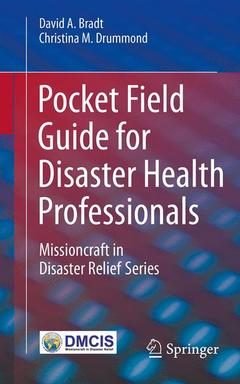Description
Pocket Field Guide for Disaster Health Professionals, 1st ed. 2020
Missioncraft in Disaster Relief® Series
Authors: Bradt David A., Drummond Christina M.
Language: English
Subject for Pocket Field Guide for Disaster Health Professionals:
Keywords
public health preparedness and response; disaster competencies; disaster epidemiology; disaster management; disaster relief; natural and technological disasters and emergencies; field operations; humanitarian aid work; outbreak investigation; medical coordination; civil-military (civ-mil) cooperation; conflict-affected populations; missioncraft; rapid epidemiological assessment; refugees and displaced persons; sanitation; team leader; vector control; international health; disaster health professionals
Approximative price 105.49 €
In Print (Delivery period: 15 days).
Add to cart311 p. · 12.7x20.3 cm · Paperback
Description
/li>Contents
/li>Biography
/li>Comment
/li>
The Pocket Field Guide for Disaster Health Professionals: Missioncraft in Disaster Relief is a disaster management toolkit containing briefing checklists, systems profiles, assessment forms, reporting templates, project management worksheets, and other tools required in the field. It also provides mission-critical technical reference information adapted from internationally recognized sources.
?Missioncraft? is the art and science of preparing and conducting effective field operations. This Field Guide enables disaster healthprofessionals to collect and analyze critical information and then implement high-impact interventions in field settings.Tools and reference information are structured in a concise, comprehensive, structured format. Sections are arranged in logical order of relief operations to facilitate application in key field activities. These activities include:
- Field briefing
- Field assessment
- Field recommendations
- Field reporting
- Field project and staff management
- Medical coordination
The Pocket Field Guide for Disaster Health Professionals is an authoritative resource for field-based clinical and public health providers responsible for health outcomes of disaster-affected populations; team leaders and medical coordinators in governmental, non-governmental, Red Cross, and UN agencies; information and program staff supporting technical best practices in relief operations; and, trainers preparing health professionals for field missions.
Introduction.- Section 1: Field Briefing.- 1.1: Security Checklist.- 1.2: Medical Handover Checklist.- 1.3: Health System Profile.- 1.4: Emergency Management System Profile.- Section 2: Field Assessment.- 2.1: Rapid Epidemiological Assessment.- 2.2: Site-specific Assessment.- 2.3: Feeding Center Assessment.- 2.4: Population and Infrastructure Damage Estimation.- 2.5: Sectoral Gap Identification.- Section 3: Field Recommendations.- 3.1: Rapid Epidemiological Assessment Recommendations.- 3.2: Recommendations Worksheet.- Section 4: Field Reporting.- 4.1: Rapid Epidemiological Assessment Report.- 4.2: Weekly Health Situation Report.- 4.3: Health Sector Status Summary.- Section 5: Field Project and Staff Management.- 5.1: Project Planning Overview.- 5.2: Project Plan of Action.- 5.3: Logical Framework Definitions and Process.- 5.4: Logframe Template.- 5.5: Project Monitoring and Evaluation Worksheet.- 5.6: Remote Management Worksheet.- Section 6: Medical Coordination.- Core Documents.- 6.1 Medical Coordinator Work Products.- 6.2 Health Cluster Principles of Coordination.- 6.3 Health Cluster Meeting Agenda.- 6.4 Health Cluster Meeting Process.- Section 7: Technical Annexes.- Guidance Notes.- Annex 1 Humanitarian Programs.- Annex 2 Security Sector.- Annex 3 Health Sector.- Annex 4 Tropical Medicine.- Annex 5 Epidemic Preparedness and Response.- Annex 6 Diagnostic Laboratory.- Annex 7 Acronyms.- Section 8 Resilience and Reentry.- Epilogue.
A unique reference addressing the spectrum of operational technical information required by humanitarian health professionals in health emergencies and disasters
Benefits readers with unique features and content such as portable tool fits and technical annexes
Includes key information necessary for rapid response from subject matter experts




